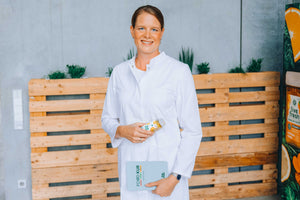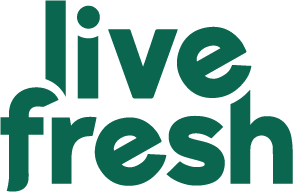Wir haben einen unserer Obstbauern sowie den Bio-Obstgroßmarkt der BayWa in Ravensburg besucht, von denen wir unsere Bio-Äpfel für unsere Säfte bekommen. So können wir Dir genauer zeigen, wie der Bio-Apfel in unseren Saft kommt. Nach der Ernte, Sortierung sowie Lagerung werden alle Bio-Äpfel mit kleinen Makeln, aber sonst perfekter Qualität, also alle Äpfel, die nicht mehr als Tafelobst verkauft werden können, zur Weiterverarbeitung in unsere Saftmanufaktur geliefert. Qualität und Regionalität unserer Produkte sind für uns sehr wichtige Werte und daher sind wir froh so tolle Äpfel bei uns aus der Region zu bekommen. Wir haben uns mit dem Leiter des Bio-Obstgroßmarktes der BayWa unterhalten und er gibt uns Einblicke woher die Bio-Äpfel angeliefert werden, welche Vorgänge im Bio-Obstgroßmarkt ablaufen, also welchen Weg der Bio-Apfel von der Plantage zum Kunden durchläuft sowie wie die Lagerung und Sortierung der Bio-Äpfel abläuft. Außerdem verrät er wie sie es schaffen an ihrem Standort klimaneutral zu wirtschaften. In unserem Video unten im Blogbeitrag bekommst Du außerdem weitere Infos von einem unserer Obstbauern der BayWa, den wir ebenfalls interviewt haben. Das Video zeigt Dir den kompletten Weg der Bio-Äpfel inklusive Interviews – von der Plantage bis in unseren Saft und in das Paket, das Du von uns bekommst.
Highlights
- LiveFresh besuchte seinen Bio-Apfellieferanten und den Bio-Obstgroßmarkt in Ravensburg.
- Die Äpfel stammen von regionalen Bauern und werden nachhaltig verarbeitet.
- Der Standort nutzt Grünstrom, LED-Beleuchtung und eine Solaranlage zur Klimaneutralität.
- Ein Video im Blog zeigt den Weg der Äpfel von der Plantage bis in die Saftflasche.
Where do you get your apples from?
The apples marketed by BayWa come from family farms in Baden-Württemberg and southwest Germany, mainly from the Lake Constance region. The fruit-growing families are members of the Württemberg Fruit Cooperative (WOG) and mainly grow pome fruit (apples and pears) but also berries and stone fruit. Our fruit producers have a great deal of know-how and grow the fruit with a great sense of responsibility for people and the environment. They are supported and advised by WOG. BayWa provides fruit producers with all the services required after the harvest to get the fruit onto the shelves of retailers. Around 25% of the fruit that BayWa collects is produced by its members in accordance with organic farming guidelines. In the case of apples, this is every 4th apple. The organic cultivation areas of WOG members are mainly located around Ravensburg. Organic cultivation on Lake Constance has developed very successfully since the end of the 1990s, which is why the Ravensburg fruit wholesale market has been exclusively processing organic produce since 2005.
What processes take place in the organic fruit wholesale market? How do apples get from the orchard to the customer?
When the fruit growers have harvested their fruit, they bring it to us at the wholesale fruit market. Here we get an initial impression of the quality of the fruit as part of the incoming goods inspection and then decide which route they will take - whether they can be sold as dessert goods or go into processing, i.e. become applesauce or juice, for example. The great thing about apples is that there is a sales channel for every quality without any food losses. Before the goods can be delivered, various steps are necessary to meet customer requirements. We sort the apples according to various criteria, e.g. how big, how red and how heavy they are. We can also determine if they have damage to the skin. We then pack them in a variety of different packaging, from small boxes to 4-packs or nets. So that we can sell the apples to customers almost all year round, we store them in large refrigerated chambers so that they remain crisp and juicy for as long as possible.
How do the apples get sorted? What special function does the water basin have during sorting?
When sorting, we take a very close look at each apple, or rather our fully automated sorting system does this for us. It checks each apple from all sides using various cameras, determines how big and red the fruit is, what weight it has and whether the skin is flawless. In the near future, we will also be able to use infrared cameras to check the internal quality, i.e. whether the apple is good through and through. When sorting, we make use of a physical property of the apple. As it is lighter than water, it floats and so we can transport it gently through our process with water without it becoming bruised. After the cameras have checked each apple, the computer or sorting program decides in which of the 30 channels of the water basin the apple may be placed by the machine. Each channel is assigned a different combination of sorting criteria so that we can determine the desired size and quality for each customer from the crates delivered.
How and for how long are the apples stored? How do you as a company always manage to supply us with fresh apples?
There is a wide range of apple varieties - from classic varieties such as Gala and Jonagold to special organic varieties such as Topaz and Santana. Each variety has a specific biological shelf life, i.e. each variety can be stored for different lengths of time. Some varieties are only refrigerated and sold in the fall. Others, which we would like to sell in the spring or summer of the following year, can be put into a kind of hibernation by changing the air composition in the warehouse so that they do not ripen any further. This enables us to store apples for up to 10 months so that our organic fruit from Lake Constance can be enjoyed for much of the yearn.
How do you manage to operate in a climate-neutral way at your site?
Responsible use of natural resources and the reduction of CO₂ emissions to protect the climate are important to us. That is why we are actively involved in climate protection and are also working on a comprehensive sustainability concept. Part of this was the gradual climate neutrality of the BayWa fruit locations, which have all been climate-neutral since 2018 - including the organic fruit wholesale market in Ravensburg. We work according to the established principle for this:
(1) Avoid - e.g.: Switching to green electricity
(2) Reduce - e.g: Switching to LED lighting
(3) Compensate - this always comes last
Since 2020, we have also been producing our own electricity on the roof of the wholesale fruit market, which we use for our own processes. In the next step, we are now looking into the area of cultivation together with our growers' cooperative WOG with the aim of soon being able to offer climate-neutral apples.
Video - How the organic apple gets into our juice
Watch our video about the entire journey of organic apples to the juice, including interviews with the head of the BayWa fruit wholesale market in Ravensburg and one of our fruit growers, and get exciting and interesting insights.
Do you fancy a few cold-pressed juices and shots after hearing all this exciting information about our organic apple supplier? Then take a look at our selection!
Das könnte dich auch interessieren

Dr. Ulrike Fischer
Nutritionist
Developed on a scientific basis by Dr. Ulrike Fischer, who holds a doctorate in nutritional science.
Wir haben einen unserer Obstbauern sowie den Bio-Obstgroßmarkt der BayWa in Ravensburg besucht, von denen wir unsere Bio-Äpfel für unsere Säfte bekommen. So können wir Dir genauer zeigen, wie der Bio-Apfel in unseren Saft kommt. Nach der Ernte, Sortierung sowie Lagerung werden alle Bio-Äpfel mit kleinen Makeln, aber sonst perfekter Qualität, also alle Äpfel, die nicht mehr als Tafelobst verkauft werden können, zur Weiterverarbeitung in unsere Saftmanufaktur geliefert. Qualität und Regionalität unserer Produkte sind für uns sehr wichtige Werte und daher sind wir froh so tolle Äpfel bei uns aus der Region zu bekommen. Wir haben uns mit dem Leiter des Bio-Obstgroßmarktes der BayWa unterhalten und er gibt uns Einblicke woher die Bio-Äpfel angeliefert werden, welche Vorgänge im Bio-Obstgroßmarkt ablaufen, also welchen Weg der Bio-Apfel von der Plantage zum Kunden durchläuft sowie wie die Lagerung und Sortierung der Bio-Äpfel abläuft. Außerdem verrät er wie sie es schaffen an ihrem Standort klimaneutral zu wirtschaften. In unserem Video unten im Blogbeitrag bekommst Du außerdem weitere Infos von einem unserer Obstbauern der BayWa, den wir ebenfalls interviewt haben. Das Video zeigt Dir den kompletten Weg der Bio-Äpfel inklusive Interviews – von der Plantage bis in unseren Saft und in das Paket, das Du von uns bekommst.
Highlights
- LiveFresh besuchte seinen Bio-Apfellieferanten und den Bio-Obstgroßmarkt in Ravensburg.
- Die Äpfel stammen von regionalen Bauern und werden nachhaltig verarbeitet.
- Der Standort nutzt Grünstrom, LED-Beleuchtung und eine Solaranlage zur Klimaneutralität.
- Ein Video im Blog zeigt den Weg der Äpfel von der Plantage bis in die Saftflasche.
Inhalt







